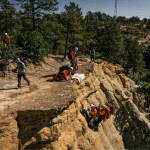Saddle Sore: ‘You can do better’

Tony Vagneur/Courtesy photo
She was born in Aspen, back in the glory days of the Silver Queen — when this place bustled — and floated on riches coming out of the ground. Her parents were in the mining business, although cursory research doesn’t disclose in what fashion. With the decline in mining, the family moved back to Denver, where the Copelands apparently were situated before coming to Aspen.
There is a lot unknown about this woman, but if you went to school here in the 1950-’70s era, you likely believed you were one of her favorites, if not the favorite. That’s just how she made most students feel, especially in her role as the office secretary of the school principal. Her penmanship was — and I’m not exaggerating — excellent and precise, just as one would expect of a teacher from that time period. This columnist, whose own handwriting is a disaster, used to enjoy watching her write out his excused absence slips upon his return to school, whether deserved or not.
Mrs. Twining was just Mrs. Twining, one of those fixtures at the school. Before she became the office secretary, she taught English and Social Studies. Teachers changed, principals changed, but not Mrs. Twining. Everyone knew who she was, many had occasion to interact with her at times, but we really didn’t know much about her.
At some point, Miss Maude Copeland hooked up with W.H. Twining, who came to Aspen in 1901 to start his medical practice. Maude and the Doc were married in 1922, for what, by all appearances, was a very successful marriage. It is clear that Maude, although never recognized as a “nurse,” was the manager of Dr. Twining’s medical practice, setting up appointments, billing, handling all aspects of the busy office.
In 1932, Aspen’s Citizen Hospital closed due to the depression. Dr. and Mrs. Twining leased it from the hospital board, ensuring that medical care continued for local citizens. In addition, Dr. Twining made house calls, not only around town but some as far away as Capitol Creek. According to articles and advertisements in local papers, Mrs. Twining was the driving force behind blood drives, biennial visitations from a traveling X-ray company, looking for early signs of tuberculosis (Folks in Aspen didn’t get tuberculosis, but there were scattered cases of silicosis, from the mining). It doesn’t say so anywhere, but she likely kept the hospital profitable, if only marginally.
In 1935, the Twinings bought the Sardy House, a charming and dignified Main Street abode built in 1892 by a man named Atkinson.
As a curious aside, Atkinson sold the house in 1918 for $800 — a paltry sum by today’s standards. Wading through the social notes in local papers, it would appear the Twinings lived there until 1946, when Dr. Twining died. It may have provided a medical office, as well.
Her diligence to the school district was no more impressive than her community involvement, as it appears Mrs. Twining never missed a meeting of the Aspen Chapter AR of P.E.O. (Philanthropic Educational Organization), which was established in 1917. It originated from the Aspen Reading Club, a group of 12 women who sought a broader purpose beyond literature discussions. The group met about once-a-month, with names from the chapter’s past reading like a who’s who of Aspen women: Lena Van Loon, Dorothy Shaw, Florence Williams, Clara Williams, Gladyce Christiansen, Margaret Willoughby, and Mona Frost. The chapter is still relevant in today’s Aspen.
One spring, Mrs. Twining hired me to rake the yards of two properties she owned, on Main Street, where the First National Bank was originally built in Aspen. Personal details about her are scarce, but as I said at the start, Mrs. Twining remains vivid in the memories of those who passed through the old Red Brick School — now the Red Brick Center for the Arts.
Only once did she express displeasure with me, on what seemed like the umpteenth occasion of my being sent to the principal’s office: “You can do better, Tony.”
Tony Vagneur writes here on Saturdays and welcomes your comments at ajv@sopris.net.
Tony Vagneur writes here on Saturdays and welcomes your comments at ajv@sopris.net.









